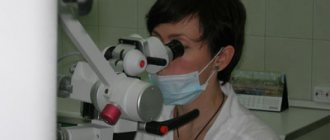Author Yuri Nosovsky
01/19/2015 15:09 (Updated: 03/17/2020 10:13)
Health » Healthcare
Recently it became known that a training program for family doctors is being launched in Moscow. Within the framework of this program, it is planned to train 2.3 thousand doctors - mainly from among local therapists. How does a traditional primary care physician differ from a family doctor? Let's look into this difficult medical issue.
What is the difference between the words doctor and physician, and when to use them correctly?
Unfortunately, for most residents the meaning of these words is absolutely equivalent. In some situations, the concepts can indeed be equated to each other, but in others such a replacement can confuse the audience.
Let's take a closer look at the meaning of both concepts and the cases of their use.
Who is supposed to be called a “doctor”?
First of all, only citizens who have received a higher medical education . Mainly, the doctor is engaged in practical activities. Its primary task is to maintain the human body in a state of full functioning.
At the same time, a physician must necessarily undergo a training course at a university, because without this it will simply not be possible to detect and prevent pathology in a timely manner. If the position of a doctor is performed by a person without the appropriate level of education, criminal liability will be imposed, because we are talking about the health and life of a person.
The word "doctor" has roots in Old Slavic . It comes from the verbs “to speak”, “to lie”. In Serbia and Croatia it is translated as “sorcerer”, “witch doctor”, and in Bulgaria as “sorcerer”. This is probably due to the fact that healing is one of the most ancient activities.
It has been repeatedly intertwined with philosophy, alchemy and theology, so many are of the opinion that medical treatment has a largely psychological effect.
The social position of a doctor in our century is contradictory. Firstly, it is believed that doctors should be shown respect , since this profession is directly related to the moral values of the individual (depending on the person’s ability to sacrifice).
Sometimes it is the empathy and timely support of a physician that plays a key role in the client’s recovery, because the doctor enjoys authority. Secondly, excessive effort is combined with low wages, compared to other specialists who have completed the same period of training.
Often doctors do not have enough funds to subscribe to medical journals or take advanced training courses.
Who is the doctor?
A researcher can receive the title of doctor after defending a doctoral dissertation. Only a candidate of science can obtain this degree . The dissertation is an independent research work of the employee. It is written both for obtaining the title of Candidate of Sciences and for obtaining the title of Doctor.
A higher degree gives a researcher the opportunity to independently organize and conduct research experiments, and a scientist gives the opportunity to teach. In addition, both theorists receive a salary increase and the prospect of receiving funds for the purchase of housing.
The dissertation can be presented in three ways:
- handwritten (now in electronic form);
- in the form of a monograph (a small book with evidence of the relevance of the topic and relevant reviews);
- as a scientific report (in accordance with established requirements).
The official defense of the dissertation work is carried out before the assembled council. It must necessarily include doctors of science in the specialty to which the defense concerns, and scientific organizations are also involved.
All researchers can take part in reviewing the defense of work for an academic degree. After a committee member writes his review, a secret vote is held. at least 2/3 of those present vote for granting this employee a higher academic degree , a request to confirm the decision is sent to the Higher Attestation Commission.
Its employees make the final decision.
According to the Resolution on the procedure for awarding degrees , the dissertation material must be submitted for consideration to representatives of the dissertation council 3 months before organizing the defense. The submitted abstract will be accompanied by an abstract.
This is a 2-2.5 page work that displays the main provisions of the dissertation. The work itself should include:
- data confirming the need for the research performed;
- a theoretical basis that reflects the work that became the prerequisite for the research;
- practical activities of the candidate to obtain the necessary data;
- prospects for the development of the problem being studied.
Drawing conclusions
Based on the above, we see that the doctor is an employee of a medical institution. He is engaged in practical activities. To become a physician, it is enough to obtain a higher medical education, but you do not need to be a doctor of science for this.
Doctor is the title of the highest academic degree. This employee can devote himself to medicine and engage in treatment, but the main type of his work is theoretical and research activities.
Story
People have been treating each other since time immemorial, but as a science, medicine began to take shape in Ancient Rome and Ancient Greece. A serious contribution to the development of medical thought was made by Hippocrates, Galen and Vesalius, who argued that illness is not a punishment for sins, but a malfunction of the body caused by completely earthly, and not mystical, reasons.
The great ancient Greek physician Hippocrates is unconditionally recognized as the forefather of the medical profession. It was he who began to classify diseases based not only on their location, but also on the causes of their occurrence. The ancient Roman doctor and philosopher Galen made significant contributions to the development of physiology as a science and is considered the founder of experimental medicine. A Belgian, and by and large a citizen of medieval Europe, Vesalius entered the history of medicine as the father of modern anatomy.
In the Middle Ages, medicine fell into decline due to the strong influence of the church, which considered any scientific research sinful, prohibited the use of painkillers and dissection of corpses to study the normal anatomy of the human body and pathological changes in organs. One of the few scientists who continued to contribute to the development of scientific healing during the troubled era of the Middle Ages was Ambroise Paré. He performed minor operations, invented several instruments, and is considered the founder of modern surgery.
Later, a big breakthrough was the invention of the dentist W. Morton - he found a way to dull pain with the help of chemicals. German physicist W. Roentgen discovered radiation, thanks to which it became possible to diagnose the condition of internal organs without violating the integrity of tissues. At the end of the 18th century, the Englishman E. Jenner developed an effective vaccination against smallpox, and this became a breakthrough in the fight against dangerous infectious diseases. Later, Louis Pasteur discovered a vaccine against rabies and anthrax.
In the 20th century, discoveries came one after another: insulin, which was life-saving for diabetics, was isolated in the laboratory; chemotherapy drugs that are harmful to cancer cells have been found; hormonal agents and antibiotics were synthesized; dialysis techniques for renal failure have been developed; organ transplantation operations have been completed. There is every reason to believe that the 21st century will be no less rich in new discoveries.
Difference between doctor and doctor
Human life is quite often associated with a wide variety of branches of science and specialties, however, there are areas that we need more often than others. An example of such a field is medicine. In fact, a person is surrounded by a wide variety of medical aspects .
In particular, each of us, or almost everyone, is born in an appropriate medical institution. In active life, he is observed in the local department of the same clinic and undergoes a medical examination. He also brings his children there. Considering how common it is to refer to doctors as doctors in everyday life, it is not surprising that many wonder whether these synonyms are similar and whether they are freely interchangeable.
In order to fully appreciate all the features and traits of these concepts, to eliminate errors and incorrect use, it is better to understand everything in more detail.
So, the doctor is a practicing specialist who has received the required medical education. In addition, doctors have certain qualifications in a specific field of activity and may have a narrow focus in medical science.
If we talk about such a concept as a doctor, then this is actually a degree that follows a candidate of sciences. This is a scientific gradation that is assigned directly to a person, and not at all to the object of research. It is worth noting that doctors of science, even those who have devoted their research to medicine, may not necessarily be doctors.
On the other hand, not many doctors actually have a doctorate or candidate's degree, since in general practice, in-depth scientific research often takes up too much of the practitioner's time. At the same time, doctors of sciences, deeply focused directly on the study of characteristic scientific or even medical aspects, simply do not have time for direct practice and assistance, as doctors do.
After such clear definitions, a reasonable question arises as to why, in principle, a strange confusion between doctor and doctor arose in society. Why are they so often used as synonyms? Of course, this is connected with history. In Western Europe, from quite old times, there was a peculiarity that only those who received an academic degree at a university could be practicing doctors.
That is why the doctor had to write and defend a dissertation and become a doctor. It is worth noting that in those days, calling a doctor “doctor” was a good sign, since this significantly increases the level of the specialist, comparing him to a real professional in the field of medicine.
However, in practice today everything is completely different. Ordinary communication ethics does not accept such a term in relation to doctors. Addressing a doctor as a doctor is already considered unacceptable or extremely unethical. It's like calling a simple military man a general.
In general, there is currently no requirement for a doctor to obtain a doctorate. The amount of data that is transferred to specialists at universities is orders of magnitude greater than the knowledge that doctors of old had. A modern doctor will give odds to any specialist with an academic degree of past centuries. That is why it is quite understandable that a person with such high training is allowed to treat people.
It is worth noting that “doctor” itself is an English title. The original Russian words are “doctor” and “doctor”. Doctor is short for “doctor,” that is, the same doctor. Traditionally, a doctor is called upon to devote all his knowledge, attention and abilities to a detailed study of the general physiology of a person, prevention and relief from a wide variety of diseases.
At the same time, a doctor exclusively means the presence of a characteristic certificate, which he received after completing his internship. There are also veterinarians who have relevant diplomas from a higher educational institution in the veterinary section.
It is these specialists who treat animal diseases, maintain sanitary breeding standards, and monitor and prevent contagious diseases to maintain the health and integrity of the livestock population.
Let us also mention that in Russia and certain CIS countries there is also such an academic degree as a doctor. To obtain the title, a specialist must write an appropriate dissertation , which must fully comply with certain regulations and rules.
The presence of original research, strong theoretical training and informed assumptions in the framework of solving a specific scientific problem form the basis of any relevant scientific work, which qualifies for the award of a doctoral degree.
What personal qualities should a doctor have?
As we have already mentioned, a real doctor who has chosen this profession by vocation must, first of all, have a talent for healing, given to him from above. Therefore, it is impossible to imagine a doctor who would not have such personal qualities as selflessness and readiness to provide medical care to everyone in need at any time of the day. In addition, since the work of a doctor involves communicating with a large number of different people, the doctor must be:
- seasoned;
- patient;
- tactful;
- attentive;
- responsible;
- neat;
- sociable;
- stress-resistant;
- friendly;
- friendly.
If we talk about the professional qualities of a doctor, then such a specialist must know the physiology and anatomy of a person (animal), be able to carry out diagnostics based on obvious and hidden symptoms, carry out treatment procedures, identify possible complications, follow professional ethics, speak Latin within the scope of his competence, adhere to the Hippocratic oath.
What is the difference between a doctor and a doctor?
We are born in a medical facility, observed in a clinic, undergo medical examinations, and take our children to consultations. That is why the question often arises: what is the difference between the terms doctor and doctor.
A profession that is assigned to students who have completed a course of study, practice in medicine and received a diploma confirming knowledge, qualifications, and the right to work in medicine or surgery.
- Responsible for providing medical care to patients following a thorough diagnosis based on patient interviews and laboratory testing.
- They give prescriptions and advice to the patient on how to receive treatment and maintain health.
- Determine the urgency of subsequent examinations and appointments, prescribe medications, treatment methods, issue sick leave certificates, consistently maintain outpatient records of patients, and reports.
- They carry out prevention and plan treatment of the disease based on the diagnosis and observed symptoms.
- They refer the patient to other specialists and give directions for a more accurate ultrasound examination.
- Refers for a medical and social examination regarding disability.
Who is a doctor: profession or vocation
Medicine is the science of the structure of the human body, which is studied by all future doctors. It is divided into specializations for a more detailed study of each individual area.
The story about the doctor’s profession should begin with a description of his activities. The daily responsibilities of a specialist in this profile is making decisions on which the lives and health of people depend. Therefore, he must have deep theoretical and practical knowledge in medicine in order to make a correct diagnosis.
What is a doctor? This is a general professional who examines the patient, determines the symptoms of the disease and prescribes treatment based on this. The doctor's specialty is in demand: he is engaged in saving the most precious thing a person has - life.
Mastering medicine requires patience, diligence, and a desire to help people. Learning science begins from the bench of an educational institution and ends when a person stops practicing medicine.
The great philosopher of Ancient Greece, Socrates, said: “All professions are from people, and only three are from God: teacher, judge and doctor.” Not everyone can become a valuable and good doctor. Being a doctor is a calling.
Doctor
The highest degree is awarded to a person on the basis of defending a dissertation , the next level being the Candidate of Sciences. You can defend a dissertation on any subject. PhD candidates conduct scientific research in various fields.
Doctoral degree awarded:
- Legal.
- Economic.
- Pedagogical.
- Technical.
- Psychological.
- Medical.
- Physical and mathematical sciences.
You can be a doctor in various fields. For example: a person who has a doctorate in history is a Doctor of Historical Sciences.
How to build a career
Promotion in a government agency can be vertical or horizontal. In the first case, the doctor occupies an administrative position, and in the second, he receives a higher qualification.
A career can also be built in science if you have an interest and ability for research. Knowledge, talent and experience will help a simple university teacher or practicing doctor become not only the head of a department or dean of a faculty, but also a medical luminary of international level.
Similarities
A doctor has a diploma confirming what activities he is allowed to engage in: treating people or animals, injuries or diseases. Doctors are called orthopedists, dentists, clinical psychologists, chiropractors, and physiotherapists. In the CIS countries, a doctor or other specialist who has graduated from a university and defended his PhD thesis receives a doctorate. In America, the word means passing certification after completing an internship. Doctor is a title awarded to persons who have achieved the highest degree in the field of medicine, law, art, dentistry, and veterinary medicine. Translated from Latin, the word means to teach, teach, explain. A citizen’s academic degree is confirmed by a corresponding document – a diploma.
It is believed that in medical practice these terms are synonyms . You can say: I’ll go to the doctor, I’ll go to the doctor. The meaning doesn't change. There is no difference in such combinations, unless we consider doctors of science.
Responsibilities
The range of professional responsibilities of a doctor depends on the chosen specialty, but both therapists and surgeons must:
- Conduct an examination and interview of the patient.
- Establish a preliminary diagnosis.
- Refer the patient for necessary laboratory and instrumental studies.
- Make a final diagnosis.
- Prescribe treatment or transfer the patient to a specialist.
- Monitor the progress of therapy or carry out surgical treatment.
- Supervise the patient throughout his stay in hospital or outpatient treatment.
- Record all observations in the medical record and issue sick leave certificates.
- Upon discharge, give recommendations on further treatment and prevention of complications.
- Register a patient if he has a chronic disease or monitor his condition if he is at risk.
Differences
A doctor is a person who has graduated from a higher medical institution. A medical doctor does not have a doctorate (without a dissertation), but has a state diploma after completing an internship. The defense of the thesis is prepared a year before passing the state exams.
In Europe, this is the name given to people with completed higher education in the field of medicine, dentistry, pharmacy, and veterinary medicine. In films or TV series, actors often call each other doctor. This is due to the fact that in other countries the word has a different meaning. Patients, when coming to the clinic, often call the doctor “doctor”, showing respect. Although this is not correct. By calling a healthcare worker this way, we are somewhat exaggerating his importance.
Students study in medical universities. After graduation, students who wish to study further enter graduate school. A graduate student is a young researcher (regardless of the discipline) who writes a scientific dissertation to obtain a title in his specialty, under the guidance of a supervisor. Research often lasts many years. After defending a doctoral dissertation, the researcher receives the title. It takes many years to obtain a doctorate. There are many more doctors in medicine than professors. Only a minority of them hold the prestigious title of professor.
Doctor is a general term for all candidates of science who defended a dissertation in their specialty and received an honorary title. This is the highest title awarded on the basis of a public defense of a doctoral dissertation.
The candidate of sciences is awarded a diploma. This is the first step in obtaining a Doctor of Science. In order to become a candidate of sciences you need:
- Have a university specialist diploma.
- Pass the candidate minimum.
- Have research work supervised by the certification commission.
- Prove the value of your ideas.
- Successfully defend your dissertation.
There are two options for obtaining an academic degree:
- Postgraduate studies (3 years full-time and 5 years part-time).
- Application is a free form under the guidance of a scientific supervisor.
Wage
Doctors receive the highest salaries in Russia in Moscow and the region, in Magadan and the Far North, and the lowest in Kabardino-Balkaria. The spread, according to Rosstat, is quite large - from 40 to 176 thousand rubles. However, these statistics are, to put it mildly, overly optimistic, because in small cities or towns doctors usually earn 12–15,000 rubles. per month.
Pay often depends on the region: where living conditions are harsh, doctors earn from 137 to 176 thousand rubles. Less than 30 thousand rubles constitutes the income of doctors in the Altai Territory, Astrakhan, Tula, Voronezh regions, and Chuvashia. The salary is slightly higher in Yekaterinburg and the Krasnodar Territory - 32 thousand rubles.
In vacancies on employment sites, the average monthly salary of a doctor, depending on specialization, is:
| Speciality | Salary in rubles |
| Cosmetologist | 90 000 |
| Obstetrician-gynecologist | 90 000 |
| Anesthesiologist-resuscitator | 66 000 |
| Osteopath | 65 000 |
| Neurophysiologist | 62 000 |
| Ship's doctor | 60 000 |
| Dentist | 50 000 |
| Pediatrician | 47 000 |
| Pediatrician | 46 000 |
| Therapist | 40 000 |
| Functional diagnostics doctor | 35 000 |
| Urologist | 30 000 |
Doctor vs Doctor
"If symptoms continue, consult your doctor."
This is one of the statements that healthcare enthusiasts commonly hear. The reminder can be found in almost all commercials for medicines and vitamins. When patients experience a recurrence of symptoms, they dial their doctor to schedule an appointment for consultation.
So, which one should you visit: a doctor or a doctor? Perhaps a better question is whether there really is a difference between a doctor and a physician.
Various medical books and publications imply that doctors are responsible for providing care to patients after a thorough diagnosis, which should be based on patient interviews and physical examination. They can also provide tidbits of knowledge about how their patients can stay healthy and prevent disease.
Doctors also have the right to determine the urgency of follow-up examinations and appointments, as well as prescribe medications and treatments. Simply put, it is the doctor who advises patients when they feel that something is wrong with their bodies. Doctors plan treatment for the disease based on observed symptoms and diagnosis. They may also refer patients to specialists.
Based on the list of duties and responsibilities of a physician, it is natural to assume that the terms “doctor” and “doctor” are synonymous. It is true that the two terms can be used interchangeably in many cases. Please note, however, that all doctors are doctors, but not all doctors are doctors.
To become a doctor, a prospective medical school student must obtain a 3.8 GPA, which gets them into college for a four-year bachelor's degree; this can be considered as their preliminary education. By taking the MCATS and receiving a high score, a student can complete four more years of medical school. Upon completion, they automatically become a doctor of medicine (MD) or physician.
However, by continuing his studies for a two- to five-year specialization or residency, he can enter specific areas of medicine, remaining a doctor, but no longer just a doctor. They can choose to specialize in surgery, oncology or dermatology. They are called doctors, but not doctors. Here's where the difference comes in: Doctors have completed eight years of medical school, but doctors with a specialty have completed 11-13 years of training.
Doctors may be a physician, dermatologist, oncologist, dentist, podiatrist, pediatrician, etc.; There are various subcategories of doctor.
Their work requirements may also differ; Doctors require a medical degree from medical schools that are accredited and recognized by the state. They may also be required to present actual DEA and DPS registration certificates and proof of completion of a two-month internship. Doctors also have the same requirements; however, additional internship experience is required when they prefer to work in their specialty. Further examinations and certifications also serve as a prerequisite depending on the state in which they reside.
Finally, physicians and clinicians may differ in the way they treat patients. Doctors use drugs and medications to make their patients healthy. On the other hand, doctors can perform surgeries and more complex medical procedures. Given this information, anyone can conclude that the term "physician" is used to refer to those who have completed doctoral studies in medical schools, regardless of their specialization. "Physician", on the other hand, refers only to those who have completed their doctorate in the practice of medicine.
The emergence of this profession
The history of the medical profession dates back to primitive times. Scientists have proven that ancestors showed an interest in health, knew how to treat fractures, put sutures on a wound, tried to treat teeth, and could perform craniotomy. In addition to healing, former doctors also acted as priests: they communicated with spirits, made sacrifices, cast spells, etc.
Hippocrates is the first famous doctor who lived in Ancient Greece. With his activities, the development of medicine as a science began: he managed to combine all previous knowledge into a single whole and became the forefather of the profession. He was the first to pay attention to the causes of diseases and proved that human health is influenced by external factors. Medical students take the Hippocratic oath, which expresses the basic moral and ethical principles of a doctor’s behavior (do no harm, etc.).
In the Middle Ages in Europe, inquisitors, as representatives of the Christian church, had a detrimental effect on the development of medicine, persecuted scientists, accused them of heresy, etc. During this period, doctors were engaged in autopsy of corpses in order to study the internal structure of the human body.
In the Middle Ages, medical schools were opened in eastern countries, where doctors passed on their experience to students and wrote books about healing.
It was only during the Renaissance that medicine began to be recognized by society as an important science. Vaccination, blood group distribution, anesthesia, insulin, X-rays, etc. appeared. Doctors learned to perform operations.
The medical profession is available at colleges and universities, most of which offer full-time study. This will require a lot of effort and patience (study takes from 4 to 8 years). The choice of specialization depends on the preferences and capabilities of the applicant.
Pros and cons of the profession
pros
- The profession has enormous social significance.
- A wide choice of areas of training; the doctor can change his specialization at any time.
- Decent level of remuneration in private clinics and medical centers.
- Continuous professional development - from international conferences to UN missions. In the latter case, the doctor will need knowledge of a foreign language.
- The profession is associated with career growth; many doctors open their own medical centers.
- A doctor who does not want to engage in practical work may opt for research activities.
Short description
Doctor is one of the most ancient professions; many modern Russian applicants dream of mastering this field. Doctors specialize in medical history, diagnosis and subsequent treatment of diseases. They promote a healthy lifestyle, the benefits of vaccination and herd immunity, and often take part in social and charitable events, promotions, and programs. The duration of training to become a doctor is 8 years, but everything does not end with receiving a diploma, because doctors gain experience, improve their skills and master new knowledge from year to year.
Varieties
There are different areas of activity of a doctor:
- In the therapeutic field, specialists are involved who examine patients and prescribe them the necessary medications, the use of which will contribute to the patient’s recovery. In severe cases, the doctor prescribes an examination or gives a referral to the surgical department;
- Surgery is always associated with surgical intervention in order to eliminate pathological areas and processes that occur in the human body. People in this profession have saved many lives;
- pathological anatomical focus is necessary to determine the cause of death of the deceased;
- psychological specialization allows you to control and manage emotions, both standard and pathological.
If we talk about the classification of medical activities, we can highlight:
- pharmacists, pharmacists, pharmacists, paramedics;
- cosmetologist, massage therapist, proctologist;
- nurses, nurses, psychotherapists;
- phthisiatricians, veterinarians, virologists;
- toxicologists, bacteriologists, ophthalmologists;
- gynecologists, obstetricians, dermatologists;
- ophthalmologists, therapists, cardiologists;
- radiologists, psychoneurologists.
Pediatricians deserve special attention. These people treat children from birth to adulthood. After all, you should monitor the psychomotor development, correct posture, weight and growth of the children.
The dentist profession is considered to be quite in demand - this area is a separate direction in medicine. Toothache or caries occurs to everyone sooner or later, and here you simply cannot do without the help of a doctor. To prevent problems, patients need to see a specialist after a certain period.
Among dentists you can also find doctors with narrower specializations: surgeons, therapists, orthodontists, orthopedists, periodontists. A pediatric dentist takes care of the baby’s correct bite, fills teeth, and for adults, the doctor performs gum surgery and restores teeth.
The health of the patient is the main task of the doctor, no matter what type of medical activity he is engaged in.










